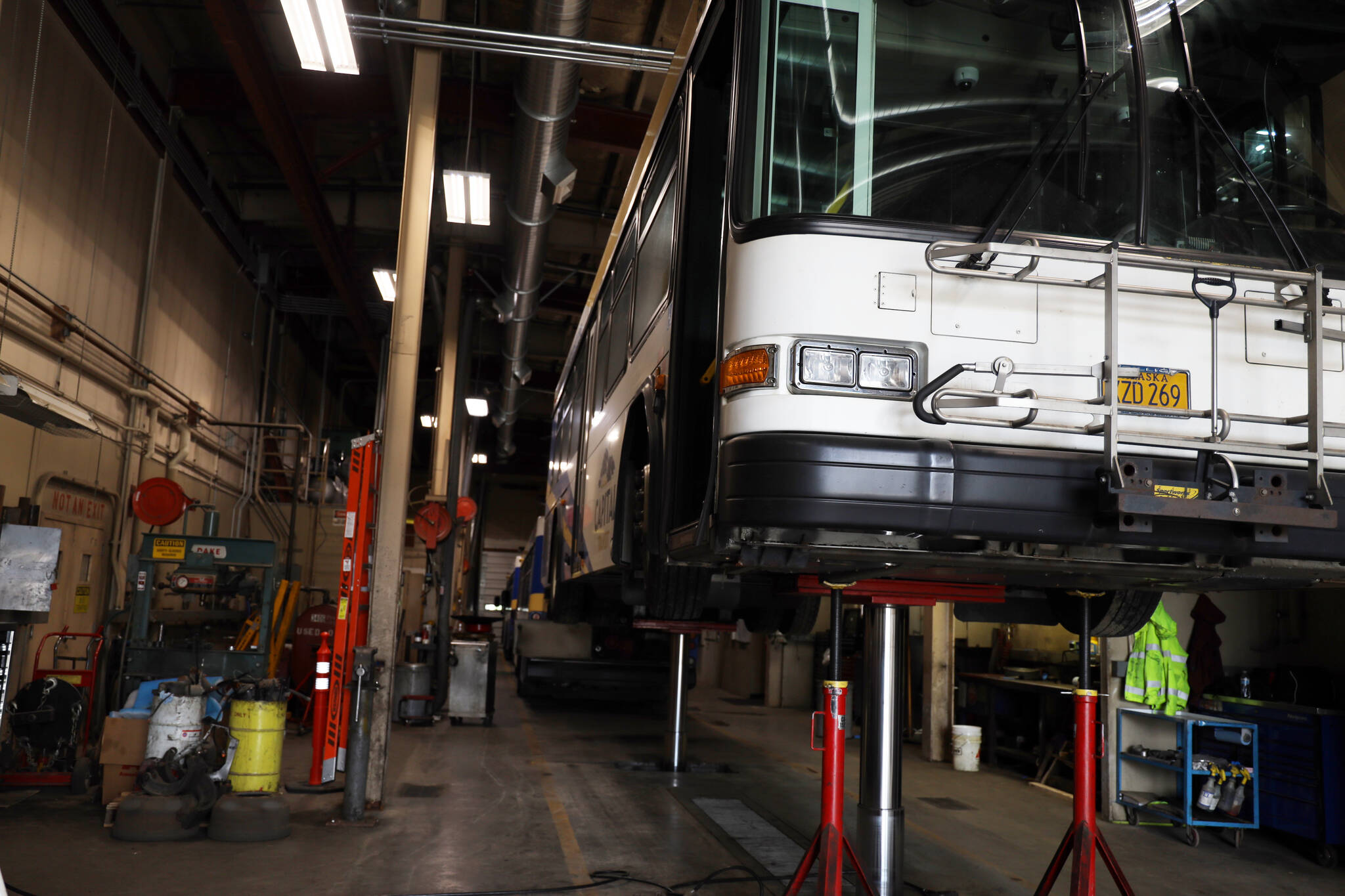Capital Transit just got one stop closer on its road to electrifying Juneau’s public transportation.
The City and Borough of Juneau’s municipal bus service, Capital Transit, announced last week that it is set to be awarded close to $2.3 million from a federal grant which will go toward infrastructure replacement to aid the city’s long-term goal of electrifying its transit system moving forward.
“It’s both part of regular facility maintenance and part going to a larger community ambition,” said Katie Koester, the director of Engineering and Public Works for CBJ. “The grant is necessary just for maintaining our public transit in Juneau but also to be able to electrify Juneau which has been a goal of the community and a goal of the Assembly for some time now.”
The grant, which the public works department applied for this spring, will go toward replacing the city’s bus barn roof, along with other modifications and infrastructure updates like addition fencing along the building to prepare for Capital Transit’s future addition of seven electric buses which are slated to hit Juneau’s roads sometime in 2024 said Richard Ross, the transit superintendent.
“It’s the infrastructure to the infrastructure,” said Denise Koch, the deputy director of the public works department.
Where does the funding come from?
The funds are provided via the Bipartisan Infrastructure Law which aims toward funding projects in the country that run parallel with the goal of net-zero emissions from federal procurement by 2050.
Through the Bipartisan Infrastructure Law, the Federal Transit Administration was allotted $1.66 billion to go toward its Low- and No-Emission and Bus and Bus Facilities programs for the fiscal year of 2022 which then provides grants for states and agencies to invest in bus fleets and facilities.
Juneau isn’t the only place in Alaska to receive a grant from this program — Fairbanks, Ketchikan and Metlakatla Indian Community were also awarded funding for their respective transit infrastructure as well.
“On August 16, the Federal Transit Administration announced $1.66 billion in grants to transit agencies, territories, and states across the country to invest in 150 bus fleets and facilities. Funded by the President’s Bipartisan Infrastructure Law, more than 1,100 of those vehicles will use zero-emissions technology, which reduces air pollution and helps meet the President’s goal of net-zero emissions by 2050,” said a FTA spokesperson in an email response.
Koester said the funding still has multiple steps to go before boots can hit the ground with the roof replacement and infrastructure modernization of the CBJ bus barn. She said the funds from the FTA need to go through Alaska’s Department of Transportation and Public Facilities before heading to the city.
As for when the funds will materialize and allow for the city to begin construction, Koester said it’s all dependent on when the grant agreement comes through.
Koester said the city is also awaiting the pending grant agreements to fund the purchase of seven electric buses and the associated charging infrastructure to add to the Capital Transit fleet, which the bus barn would house.
Trouble in electric paradise
Currently, Capital Transit only owns one electric bus — which has been in service since April 2021 and is the state’s first municipally operated electric bus — out of its 18 bus fleet.
The 40-foot Proterra bus has experienced mechanical problems since its launch and was not holding battery charges long enough to complete an entire route during this winter’s cold weather, but Koch said the city is looking at different electric bus manufacturers for the new buses.
[Plugging along: Electric bus faces mechanical issues]
The addition of seven new electric buses would replace the older diesel-powered buses, which Koester said has been a community goal in Juneau. However, without the funds OK’d, the city must continue to wait before it can place the order for the buses, which Koester said will then have long lead times upward of 16-24 months.
“It’s just another piece in the puzzle of public transit and the community’s carbon footprint goal,” she said.
Koester and Koch said they hope to have the OK sometime this fall, which will then put the buses in line to come to Juneau sometime in 2024.
“We as CBJ are in a position that as soon as that grant comes through, we are going to be in a position to move forward and purchase the seven new buses,” Koch said. “It’s unfortunate that we can’t get them sooner, but electric buses are something that the community really supports and were excited to continue to move forward in that electric bus future.”
In addition, Ross said there are a number of open positions at Capital Transit that need to be filled and said it is critical to have enough staff in order to continue running the buses throughout Juneau.
• Contact reporter Clarise Larson at clarise.larson@juneauempire.com or (651)-528-1807. Follow her on Twitter at @clariselarson.

